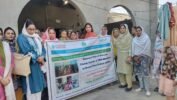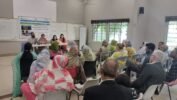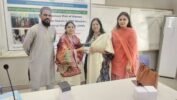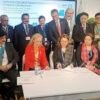KARACHI: In a groundbreaking effort to promote women’s empowerment and sustainable community development, the Karachi Water and Sewerage Services Improvement Project (KWSSIP) recently conducted an exposure visit for Women Change Agents from Essa Nagri and Soba Nagar to Orangi Pilot Project (OPP), a pioneering organization known for its grassroots development initiatives.
This visit is part of KWSSIP’s broader mission to uplift Karachi’s Katchi Abadis by improving water and sanitation infrastructure and fostering community-led solutions. A key aspect of this initiative is empowering women as agents of change to drive lasting transformations in underserved areas. The project is implemented in partnership with the National Rural Support Programme (NRSP), which plays a vital role in community mobilization and engagement.
KWSSIP has formed Women Change Agent groups in Essa Nagri and Soba Nagar, equipping local women with the tools to lead community development. These groups focus on enhancing water, sanitation, and hygiene (WASH) practices, advocating for better infrastructure, and encouraging sustainable solutions tailored to community needs.
The OPP is globally recognized for addressing urban poverty through community-based initiatives. Renowned for its low-cost sanitation models and participatory approaches, OPP has transformed countless lives in Karachi’s informal settlements.

The exposure visit provided Women Change Agents a firsthand opportunity to learn from OPP’s success stories.
The day began with an engaging presentation by OPP senior program managers, Ashraf Saghar and Parveen, followed by a field visit to Gadap Town, a community-driven development model.
In Gadap Town, the Women Change Agents witnessed the transformative power of grassroots mobilization. Local women had united to tackle critical sanitation issues, raising funds and organizing the construction of sewerage lines to connect their households to the main drainage system. This collective effort significantly improved the community’s infrastructure and underscored the impact of women-led initiatives.
“The women of Gadap Town have demonstrated that unity and collective action can turn even the most daunting challenges into opportunities for progress,” said KWSSIP-NRSP Gender Specialist Saina Ali.
“This visit has underscored the transformative power of empowering women as leaders and decision-makers. Sustainable community development is only possible when women are included and gender balance is prioritized. When women take the lead, they bring unique perspectives and solutions that address the needs of all members of society, paving the way for a more equitable and resilient future,” Saina further added.

The visit also showcased OPP’s innovative approach to sustainability through the use of treated wastewater for kitchen gardening. Participants observed how this environmentally friendly practice ensures that treated water is safe for growing vegetables, which are lab-tested to meet health standards.
Reflecting on the visit, the Women Change Agents of Essa Nagri and Soba Nagar stated: “This visit has been a turning point for us. The women of Gadap Town have shown us the power of unity and perseverance. We are returning to our communities with new ideas and the determination to replicate their success.”
Hameeda Kaleem, representing KWSSIP, shared: “The OPP work has reinforced the importance of empowering women as decision-makers and leaders. KWSSIP is dedicated to providing women with the tools and resources they need to spearhead community development initiatives.” The collaboration between KWSSIP and OPP represents a significant milestone in addressing Karachi’s urban challenges. By combining OPP’s decades of experience with KWSSIP’s focus on sustainable development, this initiative empowers women to lead transformative change in their neighborhoods. The Women Change Agents of Essa Nagri and Soba Nagar are now better equipped to drive progress in their communities, ensuring improved water and sanitation systems and fostering a culture of community ownership




